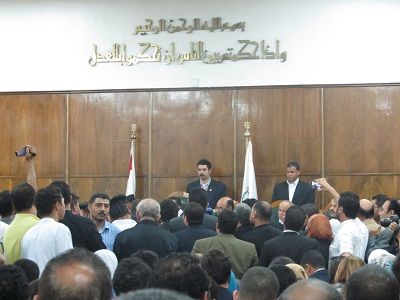CAIRO: A senior Saudi cleric is set to deliver a Ramadan sermon from within a popular virtual world platform as part of the Saudi religious authorities’ efforts to reach wider audiences through unconventional media platforms.
Sheikh Ahmad Al-Ghamdi, the Mecca director of the Commission for the Promotion of Virtue and the Prevention of Vice, will deliver a sermon entitled “Ramadan, oh youth! on Tuesday evening from a virtual mosque on Middle East Island, a fictional island in Second Life, an internet-based virtual world imagined by its users.
The virtual Ramadan sermon is the first attempt by the commission, effectively Saudi Arabia’s vice police, to reach out through a less conventional communication platform.
Prof. Hussein Amin, journalism professor at the American University in Cairo, said that after trying unsuccessfully to filter the internet, the use of new media by Saudi religious authorities suggests a new ‘if you can’t beat them, join them’ strategy.
“The Saudi clerics have been using new media for some time now, Amin told The Media Line. “Any material on television is geographically limited to a specific place or time. When you put it on satellite [television] it covers a region but this still applies to the principle of space and time. But once you put it on the internet, you break the barrier of space and time and this will make it global.
The vice police enforces religious rules such as gender segregation, enforcing strict Islamic dress code, prayer attendance and prohibiting possession or consumption of alcohol.
Some analysts saw the initiative as an attempt to lend a more amiable image to the vice police, which have come under fire for their strict clampdowns on what they perceive to be un-Islamic behavior.
Sheikh Al-Ghamdi told the Saudi daily Al-Watan that new tools of communication were part of God’s gifts to mankind.
“The objective of this lecture is to remind the youth exploring Second Life about the fires and winds of the blessed Ramadan, Al-Ghamdi said, “and how they can use this month to obey and worship, strengthening the conviction that Islam is the religion of integrity and perfection.
Amin said it was important to keep an eye on such sermons, as platforms like Second Life could be abused by the authorities.
“In my book, there’s a lot of recruitment, especially of youth, with regard to mistaken ideas presented by clerics, and the Saudi clerics in particular, he said.
The lecture, set to be delivered by the sheikh from his home in Mecca, will be transferred live into Second Life for the viewing pleasure of all interested Second Life users, called ‘residents.’
A Saudi-clothed avatar (graphic character) will represent Sheikh Al-Ghamdi in the virtual world during the broadcast and technicians based in Jeddah will provide technical support.
Second Life moderators are expecting around 1,000 residents, both male and female, to ‘attend’ the sermon live.
‘Residents’ who ‘attend’ the sermon will have the opportunity to submit live questions to the sheikh and the lecture will be translated in written form.
News of the anticipated lecture has caught the attention of Saudi youngsters and users of Second Life, especially after it was posted on Facebook and the Second Life website.
Fawwaz Al-Qarni, the technical coordinator of Middle East island, told Al-Watan that at least seven Americans have converted to Islam after learning about Islam from Muslim ‘residents’ of the virtual Middle East Island.
This is not the first time Second Life is being used as a platform for Muslims sermons.
In February, Saudi cleric Sheikh Ali Omar Badahdah delivered a sermon entitled “Gaza- Between Truth and Illusion.
The speech was delivered near the Palestine Holocaust Museum, a virtual museum set up in Second Life after Israel’s military operation in Gaza last January to document what its creators see as Israeli crimes against Palestinians.
Islam Online, an Egyptian news and information website, purchased land in Second Life in 2007 to allow Muslims and non-Muslims to perform the Hajj, the annual Muslim pilgrimage, in virtual form.
Second Life is also used by Christian religious groups for hosting virtual meeting places.
